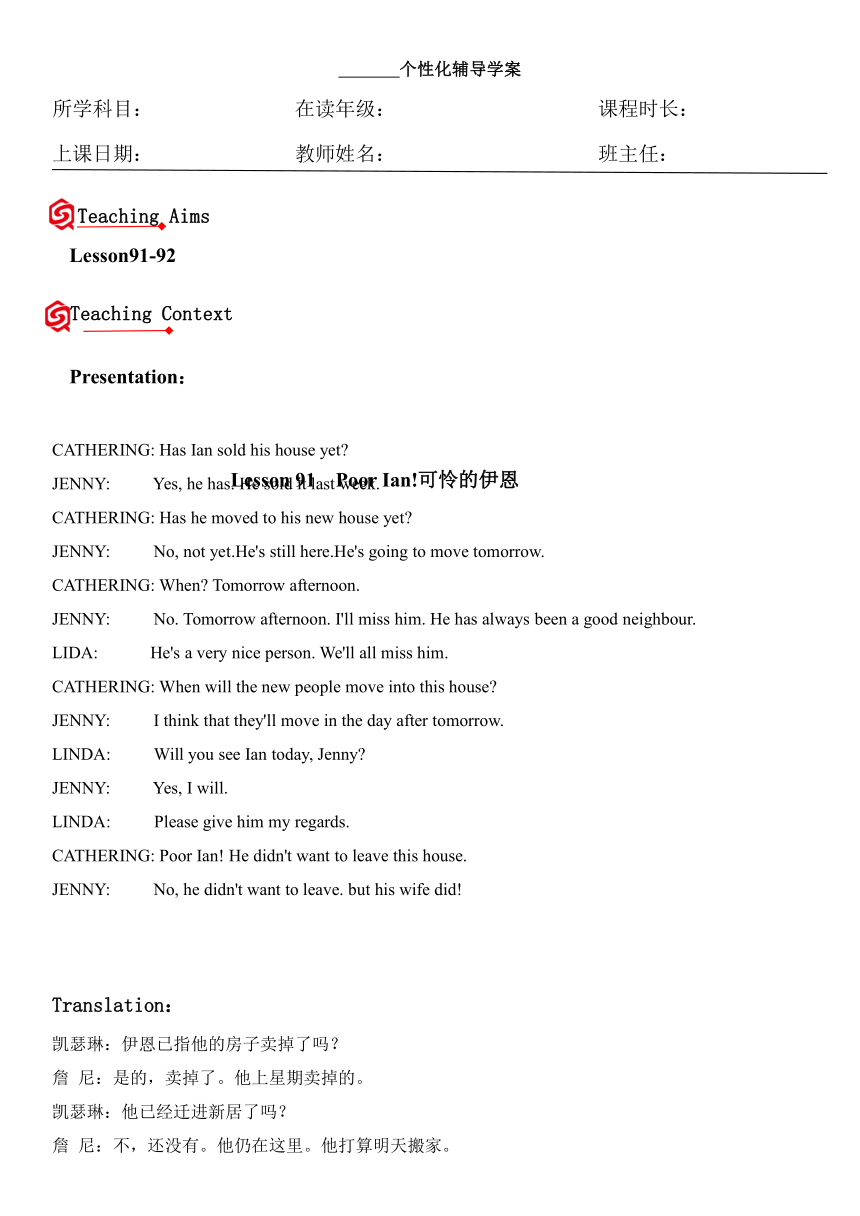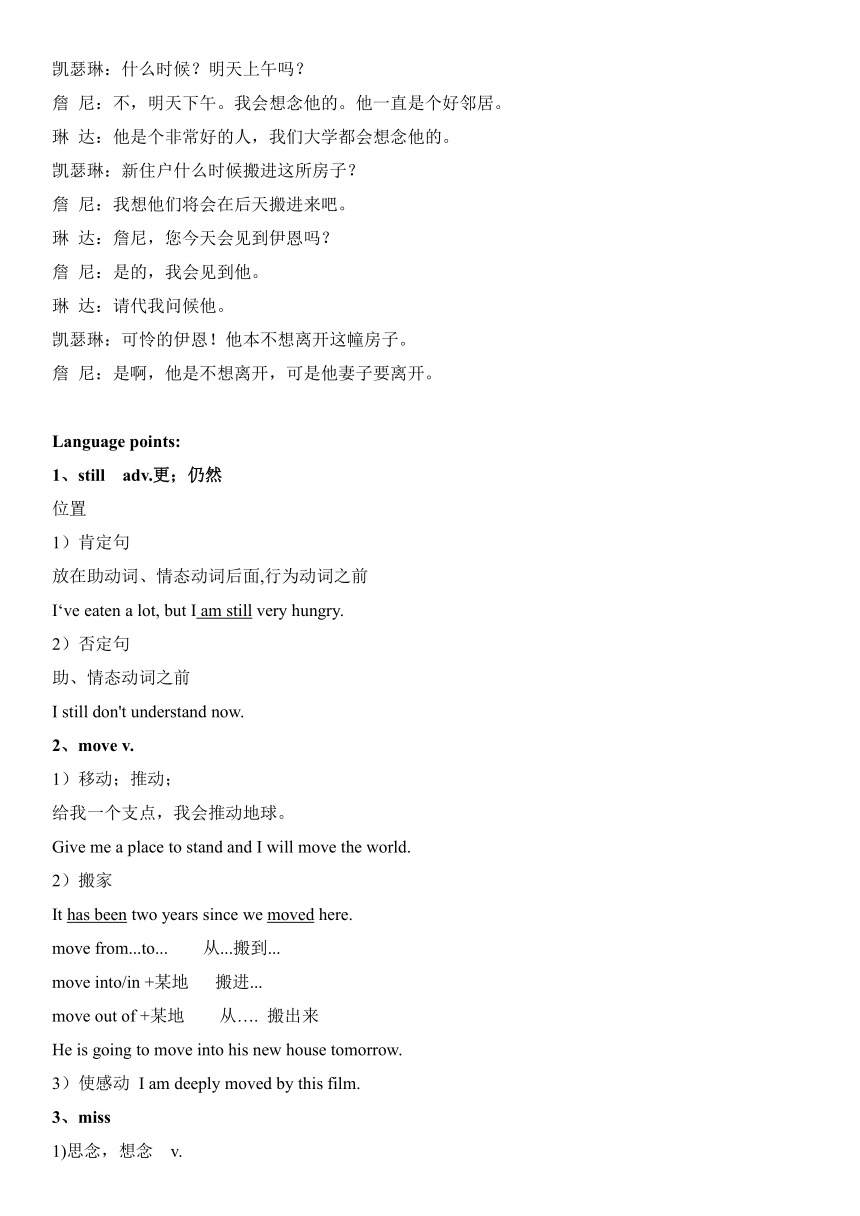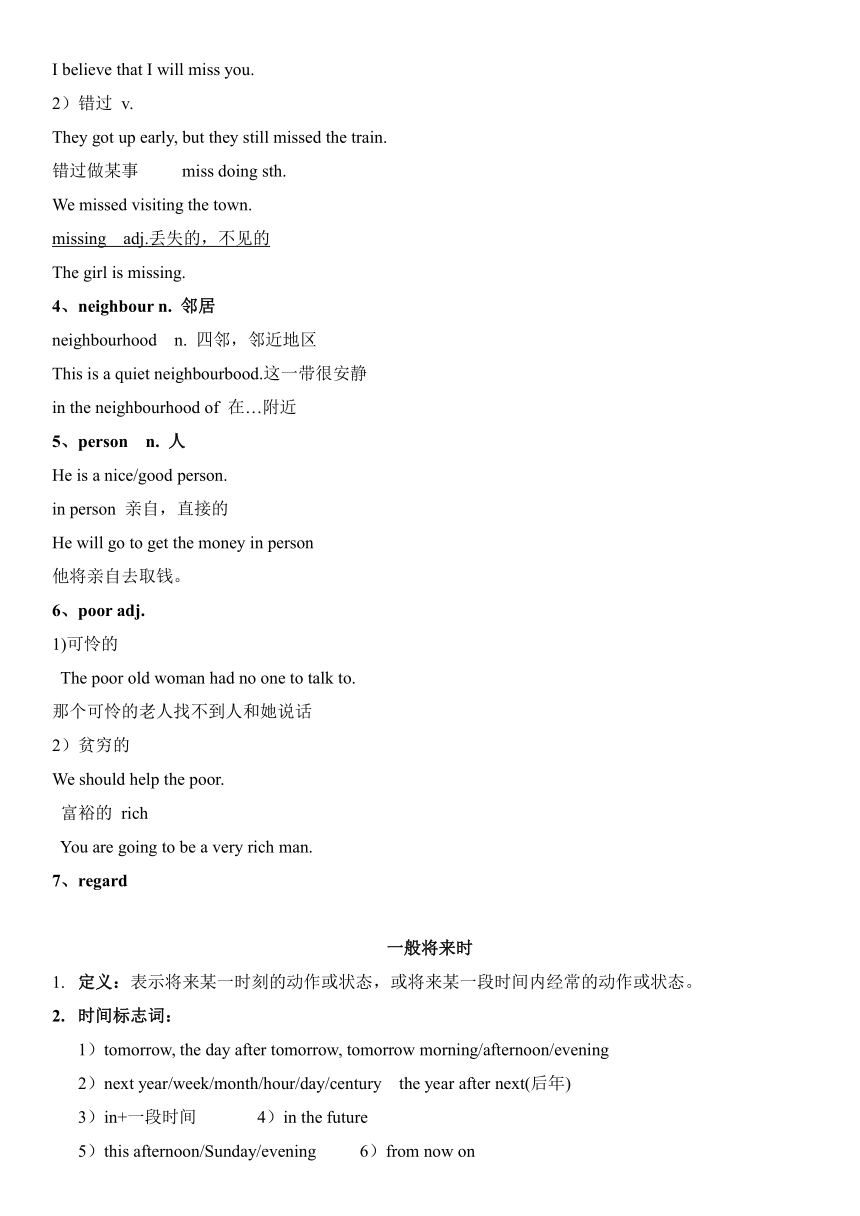新概念第一册91-92课导学案(无答案)
文档属性
| 名称 | 新概念第一册91-92课导学案(无答案) |

|
|
| 格式 | docx | ||
| 文件大小 | 61.4KB | ||
| 资源类型 | 教案 | ||
| 版本资源 | 新概念英语 | ||
| 科目 | 英语 | ||
| 更新时间 | 2023-12-25 00:00:00 | ||
图片预览



文档简介
个性化辅导学案
所学科目: 在读年级: 课程时长:
上课日期: 教师姓名: 班主任:
Lesson91-92
Presentation:
CATHERING: Has Ian sold his house yet
JENNY: Yes, he has. He sold it last week.
CATHERING: Has he moved to his new house yet
JENNY: No, not yet.He's still here.He's going to move tomorrow.
CATHERING: When Tomorrow afternoon.
JENNY: No. Tomorrow afternoon. I'll miss him. He has always been a good neighbour.
LIDA: He's a very nice person. We'll all miss him.
CATHERING: When will the new people move into this house
JENNY: I think that they'll move in the day after tomorrow.
LINDA: Will you see Ian today, Jenny
JENNY: Yes, I will.
LINDA: Please give him my regards.
CATHERING: Poor Ian! He didn't want to leave this house.
JENNY: No, he didn't want to leave. but his wife did!
Translation:
凯瑟琳:伊恩已指他的房子卖掉了吗?
詹 尼:是的,卖掉了。他上星期卖掉的。
凯瑟琳:他已经迁进新居了吗?
詹 尼:不,还没有。他仍在这里。他打算明天搬家。
凯瑟琳:什么时候?明天上午吗?
詹 尼:不,明天下午。我会想念他的。他一直是个好邻居。
琳 达:他是个非常好的人,我们大学都会想念他的。
凯瑟琳:新住户什么时候搬进这所房子?
詹 尼:我想他们将会在后天搬进来吧。
琳 达:詹尼,您今天会见到伊恩吗?
詹 尼:是的,我会见到他。
琳 达:请代我问候他。
凯瑟琳:可怜的伊恩!他本不想离开这幢房子。
詹 尼:是啊,他是不想离开,可是他妻子要离开。
Language points:
1、still adv.更;仍然
位置
1)肯定句
放在助动词、情态动词后面,行为动词之前
I‘ve eaten a lot, but I am still very hungry.
2)否定句
助、情态动词之前
I still don't understand now.
2、move v.
1)移动;推动;
给我一个支点,我会推动地球。
Give me a place to stand and I will move the world.
2)搬家
It has been two years since we moved here.
move from...to... 从...搬到...
move into/in +某地 搬进...
move out of +某地 从…. 搬出来
He is going to move into his new house tomorrow.
3)使感动 I am deeply moved by this film.
3、miss
1)思念,想念 v.
I believe that I will miss you.
2)错过 v.
They got up early, but they still missed the train.
错过做某事 miss doing sth.
We missed visiting the town.
missing adj.丢失的,不见的
The girl is missing.
4、neighbour n. 邻居
neighbourhood n. 四邻,邻近地区
This is a quiet neighbourbood.这一带很安静
in the neighbourhood of 在…附近
5、person n. 人
He is a nice/good person.
in person 亲自,直接的
He will go to get the money in person
他将亲自去取钱。
6、poor adj.
1)可怜的
The poor old woman had no one to talk to.
那个可怜的老人找不到人和她说话
2)贫穷的
We should help the poor.
富裕的 rich
You are going to be a very rich man.
7、regard
一般将来时
定义:表示将来某一时刻的动作或状态,或将来某一段时间内经常的动作或状态。
时间标志词:
1)tomorrow, the day after tomorrow, tomorrow morning/afternoon/evening
2)next year/week/month/hour/day/century the year after next(后年)
3)in+一段时间 4)in the future
5)this afternoon/Sunday/evening 6)from now on
7)one day, someday (未来的)某天 8 )soon
结构
主语+shall/will+ do+其他 (shall用于第一人称I/we)-----客观上将要
主语+be going to do -------人作主语,打算做某事、推测天气
主语+ be going to + do+其他
这种结构常用来表达事先考虑过打算要做的事以及已有迹象表明必将要发生的某事,意为“打算;就要”。
注意:be 动词要与主语的人称和数一致
如:I am going to read some books tomorrow.
Look! It's going to rain.
句式变化:
肯定句: 主语+shall/will+do
主语+ be going to + do
否定句: 主语+shall/will+not+do(will not 可缩写成 won’t)
主语+ be+ not+ going to +do
一般疑问句:shall/will+主语+ do
be+主语+going to+do
特殊疑问句:疑问词+ shall/will+主语+do
疑问词+be+主语+going to+do
其他注意点:
★ 使用 be going to 结构应注意的两点
There be 句型的 be going to 结构为:There is going to be... (注意句型中 going to 后面的 be 不能改为 have) 常用来表示将有某事发生。
如: There is going to be a football match next Saturday in our school.
★ come, go, leave, arrive 等表示位置移动的动词常用现在进行时表示将要发生的动作,它们很少与
be going to 结构连用。
如:Miss Sun is coming tonight.今晚孙小姐要来。
They are going to the park next Friday. 下星期五他们打算去公园
★ 用 现在进行时 表示将来
表示位置转移的动词(如:go, come, leave, start, arrive 等),可用 现在进行时 表示将来时,
如:1. Uncle Wang is coming. 王叔叔就要来了。
They're leaving for Beijing. 他们即将前往北京。
一 单词填空
1. My mother is in London. I __miss____(想念) her very much.
2. My brother is a __poor____(可怜的)guy. he failed his math exam once again.
3.When will they _move__(搬家) to their new house
4. Tim is my good ___neighbour__(邻居)and friend.
5. Are you ___still_ (仍然)living with your parents
二 选择
( c )1. ---Have you finished reading Harry Potter
---____. I still have some pages.
A. Yes, I do. B. No, I don’t C. No, I haven’t
( a )2. ---Your sister isn’t a nurse, is she
---____. She teaches English in a middle school.
A. No, she isn’t B. Yes, she is C. No, she is
( b )3. Yangyang never plays video games in his spare time, _____
A. is he B. does she C. doesn’t she
( a )4. She listens to the radio every day, ____
A. doesn’t she B. isn’t she C. hasn’t she
( a )5. There are many ____ in school.
A. people B. person C. human beings
( b )6. The teacher ____ an important sentence.
A. left B. missed C. lost
( b )7. There _____ a football match in our school the day after tomorrow.
A. are going to have B. is going to have C. is going to be
( b )8. Tom has been in the factory ____ he left school.
A. when B. since C. as soon as
( b )9. ---Don’t play football in the classroom.
---_____.
A. No. I don’t. B. Sorry, we won’t do it again. C. Yes, we won’t do it again.
( b )10. He has never visited the Great Hall of the People, ____
A. hasn’t he B. has he C. doesn’t he
( b )11. ---Look out! The traffic is moving fast!
---Thanks, I ____.
A. do B. will C. can
( a )12. ---Lucy didn’t come to school yesterday, did she
---_____, because she was not feeling very well.
A. No, she didn’t B. Yes, she did C. Yes, she didn’t
( )13. ____ Chinese people are ____ hardworking people.
A. The/the B. 不填/不填 C. The/不填
详解:the Chinese people 固定短语,“中国人民”,the是不能少的;后面的a people 是“一个民族”的意思。句子的意思:“中国人民是个勤劳的民族。” 答案有问题
( b )14. ---May I speak to John
---Sorry, he ___ Japan. But he ___ in two days.
A.has been to/will come back B.has gone to/will be back C.has been in/ won’t come back
( b )15. ---Is Mr. Smith really very ill
---_____. He’s in hospital.
A. I hope so B. No, he isn’t C. I’m afraid so
三 阅读并回答下列问题
All around the world, people drink the tea. But tea doesn’t mean the same thing to everyone. In different countries, people have different ideas about drinking tea.
In China, people always have tea together with their friends. They may drink tea at any time of the day. They only put tea leaves in their cups. They put nothing else in it. Japanese people also drink tea every day. It is very popular there, but they have it in a way different from that in China. In the USA people drink tea at breakfast or after meals. They usually use tea bags to make their tea. Making tea with tea bags is faster and easier than making it with tea leaves in teapot.
How many countries are mentioned(提到)in the article
3 countries
Do all countries have the same ideas about drinking
No, they don’t
When do Americans drink tea
At breakfast or after meals.
Which way to make tea is faster ,with tea bags or with tea leaves
To use tea bags to make their tea is easier to make tea.
四 翻译
1. 明天我将要搬到新房子去。
2. 后天我们将去度假。
3. 谁将给这幢房子刷油漆?
4. 后天早晨我将去修我的汽车。
5. 明天晚上我给你电话吧?
本节课主要学习了第91-92课的词汇,短语和句子,重点学习了一提高了学生对本节重点内容的运用能力。
所学科目: 在读年级: 课程时长:
上课日期: 教师姓名: 班主任:
Lesson91-92
Presentation:
CATHERING: Has Ian sold his house yet
JENNY: Yes, he has. He sold it last week.
CATHERING: Has he moved to his new house yet
JENNY: No, not yet.He's still here.He's going to move tomorrow.
CATHERING: When Tomorrow afternoon.
JENNY: No. Tomorrow afternoon. I'll miss him. He has always been a good neighbour.
LIDA: He's a very nice person. We'll all miss him.
CATHERING: When will the new people move into this house
JENNY: I think that they'll move in the day after tomorrow.
LINDA: Will you see Ian today, Jenny
JENNY: Yes, I will.
LINDA: Please give him my regards.
CATHERING: Poor Ian! He didn't want to leave this house.
JENNY: No, he didn't want to leave. but his wife did!
Translation:
凯瑟琳:伊恩已指他的房子卖掉了吗?
詹 尼:是的,卖掉了。他上星期卖掉的。
凯瑟琳:他已经迁进新居了吗?
詹 尼:不,还没有。他仍在这里。他打算明天搬家。
凯瑟琳:什么时候?明天上午吗?
詹 尼:不,明天下午。我会想念他的。他一直是个好邻居。
琳 达:他是个非常好的人,我们大学都会想念他的。
凯瑟琳:新住户什么时候搬进这所房子?
詹 尼:我想他们将会在后天搬进来吧。
琳 达:詹尼,您今天会见到伊恩吗?
詹 尼:是的,我会见到他。
琳 达:请代我问候他。
凯瑟琳:可怜的伊恩!他本不想离开这幢房子。
詹 尼:是啊,他是不想离开,可是他妻子要离开。
Language points:
1、still adv.更;仍然
位置
1)肯定句
放在助动词、情态动词后面,行为动词之前
I‘ve eaten a lot, but I am still very hungry.
2)否定句
助、情态动词之前
I still don't understand now.
2、move v.
1)移动;推动;
给我一个支点,我会推动地球。
Give me a place to stand and I will move the world.
2)搬家
It has been two years since we moved here.
move from...to... 从...搬到...
move into/in +某地 搬进...
move out of +某地 从…. 搬出来
He is going to move into his new house tomorrow.
3)使感动 I am deeply moved by this film.
3、miss
1)思念,想念 v.
I believe that I will miss you.
2)错过 v.
They got up early, but they still missed the train.
错过做某事 miss doing sth.
We missed visiting the town.
missing adj.丢失的,不见的
The girl is missing.
4、neighbour n. 邻居
neighbourhood n. 四邻,邻近地区
This is a quiet neighbourbood.这一带很安静
in the neighbourhood of 在…附近
5、person n. 人
He is a nice/good person.
in person 亲自,直接的
He will go to get the money in person
他将亲自去取钱。
6、poor adj.
1)可怜的
The poor old woman had no one to talk to.
那个可怜的老人找不到人和她说话
2)贫穷的
We should help the poor.
富裕的 rich
You are going to be a very rich man.
7、regard
一般将来时
定义:表示将来某一时刻的动作或状态,或将来某一段时间内经常的动作或状态。
时间标志词:
1)tomorrow, the day after tomorrow, tomorrow morning/afternoon/evening
2)next year/week/month/hour/day/century the year after next(后年)
3)in+一段时间 4)in the future
5)this afternoon/Sunday/evening 6)from now on
7)one day, someday (未来的)某天 8 )soon
结构
主语+shall/will+ do+其他 (shall用于第一人称I/we)-----客观上将要
主语+be going to do -------人作主语,打算做某事、推测天气
主语+ be going to + do+其他
这种结构常用来表达事先考虑过打算要做的事以及已有迹象表明必将要发生的某事,意为“打算;就要”。
注意:be 动词要与主语的人称和数一致
如:I am going to read some books tomorrow.
Look! It's going to rain.
句式变化:
肯定句: 主语+shall/will+do
主语+ be going to + do
否定句: 主语+shall/will+not+do(will not 可缩写成 won’t)
主语+ be+ not+ going to +do
一般疑问句:shall/will+主语+ do
be+主语+going to+do
特殊疑问句:疑问词+ shall/will+主语+do
疑问词+be+主语+going to+do
其他注意点:
★ 使用 be going to 结构应注意的两点
There be 句型的 be going to 结构为:There is going to be... (注意句型中 going to 后面的 be 不能改为 have) 常用来表示将有某事发生。
如: There is going to be a football match next Saturday in our school.
★ come, go, leave, arrive 等表示位置移动的动词常用现在进行时表示将要发生的动作,它们很少与
be going to 结构连用。
如:Miss Sun is coming tonight.今晚孙小姐要来。
They are going to the park next Friday. 下星期五他们打算去公园
★ 用 现在进行时 表示将来
表示位置转移的动词(如:go, come, leave, start, arrive 等),可用 现在进行时 表示将来时,
如:1. Uncle Wang is coming. 王叔叔就要来了。
They're leaving for Beijing. 他们即将前往北京。
一 单词填空
1. My mother is in London. I __miss____(想念) her very much.
2. My brother is a __poor____(可怜的)guy. he failed his math exam once again.
3.When will they _move__(搬家) to their new house
4. Tim is my good ___neighbour__(邻居)and friend.
5. Are you ___still_ (仍然)living with your parents
二 选择
( c )1. ---Have you finished reading Harry Potter
---____. I still have some pages.
A. Yes, I do. B. No, I don’t C. No, I haven’t
( a )2. ---Your sister isn’t a nurse, is she
---____. She teaches English in a middle school.
A. No, she isn’t B. Yes, she is C. No, she is
( b )3. Yangyang never plays video games in his spare time, _____
A. is he B. does she C. doesn’t she
( a )4. She listens to the radio every day, ____
A. doesn’t she B. isn’t she C. hasn’t she
( a )5. There are many ____ in school.
A. people B. person C. human beings
( b )6. The teacher ____ an important sentence.
A. left B. missed C. lost
( b )7. There _____ a football match in our school the day after tomorrow.
A. are going to have B. is going to have C. is going to be
( b )8. Tom has been in the factory ____ he left school.
A. when B. since C. as soon as
( b )9. ---Don’t play football in the classroom.
---_____.
A. No. I don’t. B. Sorry, we won’t do it again. C. Yes, we won’t do it again.
( b )10. He has never visited the Great Hall of the People, ____
A. hasn’t he B. has he C. doesn’t he
( b )11. ---Look out! The traffic is moving fast!
---Thanks, I ____.
A. do B. will C. can
( a )12. ---Lucy didn’t come to school yesterday, did she
---_____, because she was not feeling very well.
A. No, she didn’t B. Yes, she did C. Yes, she didn’t
( )13. ____ Chinese people are ____ hardworking people.
A. The/the B. 不填/不填 C. The/不填
详解:the Chinese people 固定短语,“中国人民”,the是不能少的;后面的a people 是“一个民族”的意思。句子的意思:“中国人民是个勤劳的民族。” 答案有问题
( b )14. ---May I speak to John
---Sorry, he ___ Japan. But he ___ in two days.
A.has been to/will come back B.has gone to/will be back C.has been in/ won’t come back
( b )15. ---Is Mr. Smith really very ill
---_____. He’s in hospital.
A. I hope so B. No, he isn’t C. I’m afraid so
三 阅读并回答下列问题
All around the world, people drink the tea. But tea doesn’t mean the same thing to everyone. In different countries, people have different ideas about drinking tea.
In China, people always have tea together with their friends. They may drink tea at any time of the day. They only put tea leaves in their cups. They put nothing else in it. Japanese people also drink tea every day. It is very popular there, but they have it in a way different from that in China. In the USA people drink tea at breakfast or after meals. They usually use tea bags to make their tea. Making tea with tea bags is faster and easier than making it with tea leaves in teapot.
How many countries are mentioned(提到)in the article
3 countries
Do all countries have the same ideas about drinking
No, they don’t
When do Americans drink tea
At breakfast or after meals.
Which way to make tea is faster ,with tea bags or with tea leaves
To use tea bags to make their tea is easier to make tea.
四 翻译
1. 明天我将要搬到新房子去。
2. 后天我们将去度假。
3. 谁将给这幢房子刷油漆?
4. 后天早晨我将去修我的汽车。
5. 明天晚上我给你电话吧?
本节课主要学习了第91-92课的词汇,短语和句子,重点学习了一提高了学生对本节重点内容的运用能力。
同课章节目录
